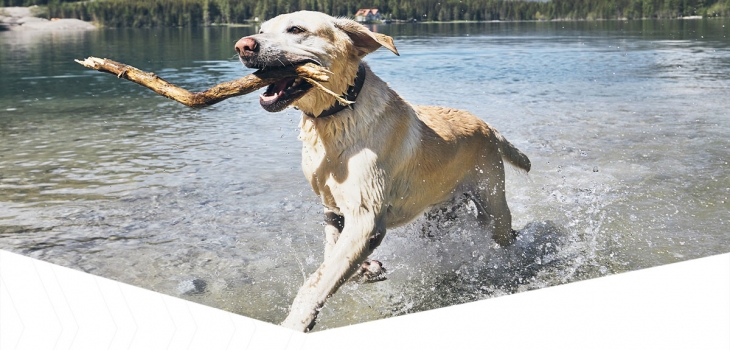
The dangers of chewing the wrong things
What is she chewing now!?
I don’t know about you but every time I hear the chomp-chomp sound of teeth gnawing through an expensive pair of boots or another one of my children’s toys I feel rather annoyed.
It’s a common occurrence in most dog owner’s households and so we have to remind ourselves that dogs are curious by nature and use their mouths to explore. Having said that it is still deeply annoying and more importantly can be very dangerous for our dogs so here are few things to remember about chewing and what can happen when something that shouldn’t be swallowed disappears down your dog’s oesophagus.
Signs to look for
New sights, tastes and smells always attract plenty of attention. As we all know dogs are notorious for swallowing pieces of paper, dishcloths, clothing, sticks, toothpicks, bones, food wrappers, rocks and other foreign objects. Many of these objects will pass through the intestinal tract without any difficulty, for example it is common for many breeders to find all sorts of objects in a dog’s stool or vomit, but sometimes these items don’t pass through and your dog can be left with a foreign body obstruction.
If your dog has a bowel obstruction, they will not only experience a lot of pain, they will also be at risk for some serious consequences. A bowel obstruction is a blockage that prevents foods and fluids from passing through the intestines. The blockage can be either partial or complete, and can cause problems with digestion as well as compromise the flow of blood to the intestines. When blood cannot reach the intestines, the tissues weaken and absorb toxic gastrointestinal contents. In severe cases, this can result in tissue death and a life-threatening inflammatory condition known as Septic Peritonitis.
Should the object not pass through the system naturally, the only other solution is to surgically remove it.
How do I know if my dog has a “Foreign Body”?
There is a long list of possible symptoms that dogs can exhibit, they generally don’t feel well and can show signs of depression. One of the first signs will be sporadic vomiting, but some other symptoms to look out for are include diarrhoea, painful abdomen and tenderness when their abdomen is touched, loss of appetite, straining when trying to pass stools, lethargy, changes in behaviour such as biting or growling when being picked up or moved.
How is it treated?
A vet will often suggest starting with a round of x-rays. Metal, bones and rock will show up on an x-ray but cloths or plastic items may not be visible. The vet may suggest a series of views or specialised x-rays, using contrast materials to try and visualise the object. Ultrasound can also be used to assist in finding obstructions in the gut.
If a blockage is diagnosed, surgery is usually recommended. More serious issues may arise if the foreign object has caused damage in the intestinal tract due to the “cutting off” of blood flow to areas in the gut. If this has happened, even for a short period of time, the affected part of the intestine can die off. This causes the dog a great deal of pain, and needs to be treated very urgently. Should this happen, it can result in an infection of the abdominal space (Peritonitis) and infection of the bloodstream (Sepsis).
Prevention is better than cure
As already discussed dogs are curious by nature and they will undoubtedly swallow inappropriate things. Try and keep them from chewing or picking up items that can cause harm. Tempting (hazardous) items should be locked away or placed out of reach. Trash cans and closets should be fortified so that curious busybodies can be kept out. Finally supervise your dog(s) during walks or when exposing them to new environments to minimise risks.
What to feed after a foreign body
Whether a foreign body has been passed by your dog or if it has been surgically removed your vet will most likely recommend a highly digestible diet to ease the digestive process and also to help aid intestinal recovery such as Eukanuba Intestinal Formula.